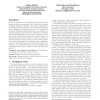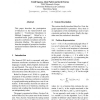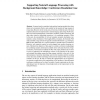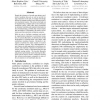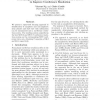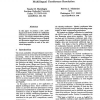137
click to vote
CIKM
2011
Springer
14 years 2 months ago
2011
Springer
As user demands become increasingly sophisticated, search engines today are competing in more than just returning document results from the Web. One area of competition is providi...
134
click to vote
COLING
2010
14 years 8 months ago
2010
A large body of prior research on coreference resolution recasts the problem as a two-class classification problem. However, standard supervised machine learning algorithms that m...
COLING
2010
14 years 9 months ago
2010
This paper describes the participation of RelaxCor in the Semeval-2010 task number 1: "Coreference Resolution in Multiple Languages". RelaxCor is a constraint-based grap...
114
click to vote
ACL
2009
14 years 12 months ago
2009
We aim to shed light on the state-of-the-art in NP coreference resolution by teasing apart the differences in the MUC and ACE task definitions, the assumptions made in evaluation ...
121
click to vote
SEMWEB
2010
Springer
14 years 12 months ago
2010
Springer
Systems based on statistical and machine learning methods have been shown to be extremely effective and scalable for the analysis of large amount of textual data. However, in the r...
112
click to vote
ACL
2010
15 years 3 days ago
2010
Despite the existence of several noun phrase coreference resolution data sets as well as several formal evaluations on the task, it remains frustratingly difficult to compare resu...
101
click to vote
ACL
2010
15 years 3 days ago
2010
This paper explores the effect that different corpus configurations have on the performance of a coreference resolution system, as measured by MUC, B3, and CEAF. By varying separa...
120
click to vote
COLING
2002
15 years 1 months ago
2002
We present a supervised learning approach to identification of anaphoric and non-anaphoric noun phrases and show how such information can be incorporated into a coreference resolu...
ANLP
2000
15 years 3 months ago
2000
In this paper we present a new, multilingual data-driven method for coreference resolution as implemented in the SWIZZLE system. The results obtained after training this system on...
108
click to vote
ACL
2004
15 years 3 months ago
2004
This paper proposes a new approach for coreference resolution which uses the Bell tree to represent the search space and casts the coreference resolution problem as finding the be...
